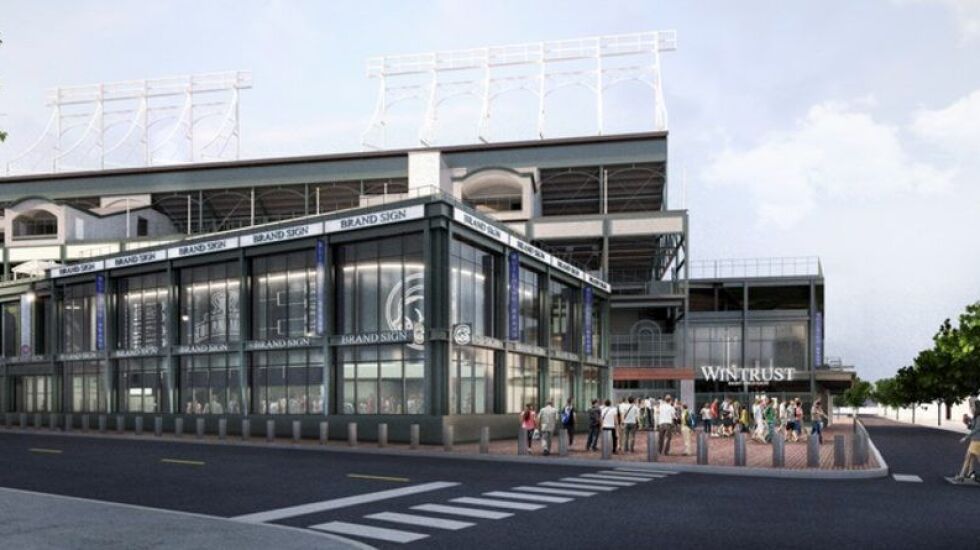
The Cubs hosted a beam-signing ceremony Friday at the site of the future DraftKings Sportsbook, which will be attached physically and spiritually to Wrigley Field. I assume everyone involved found a way to get dollar signs, commas and zeros, lots of zeros, into their signatures.
What I love most about the Cubs’ $100 million deal with DraftKings and the forthcoming glass-and-steel sportsbook is that there’s no pretense about what’s at work here. That would be money. Oh, sure, team officials have pushed the idea that the project is a way for the franchise to keep up with the evolving needs of the fanbase, a fanbase that wants to gamble. That’s very considerate of them.
But the agreement between the Cubs and DraftKings is about one thing only: the flow of cash. The Ricketts family was able to frame the renovations at Wrigley as something for the fans, in the same way it could build the Hotel Zachary across the street from the park and say it was something for tourists. It was a bit of a con, but the more enthusiastic among you bought into the notion of the Cubs’ community outreach program.
There’s no way to hide the purpose and goal of a sportsbook, however. It’s money for money’s sake. People will walk into the two-story building when it opens in 2023 to bet on sporting events, including Cubs games, and DraftKings will make a lot of money. The Cubs will benefit financially from having more people on their property and, if the sportsbook is successful, from getting another huge payday when their contract with the company is up. The meaning of life in Wrigleyville, its reason for being, is to make the Rickettses richer. So it’s perfect that Wrigley Field will soon have a gleaming sportsbook attached to it at the corner of Addison and Sheffield, like a hood ornament on a Rolls-Royce. No reason to be subtle anymore.
Also not subtle: The Cubs aren’t good at baseball.
There are so many sleights of hand going on that it’s easy to lose sight of what this is supposed to be about. You know, baseball. You can have a party on a team-owned rooftop across the street from the ballpark, you can get a scoop at Jeni’s Splendid Ice Creams on the Cubs’ “campus” and now you can bet on games. Pay no attention to the Cubs’ second rebuild in 10 years, the one that had them losing 14 of their previous 17 games heading into their weekend series against the Cardinals.
In quainter days, the Cubs sold sunshine, people-watching and bad baseball. The Ricketts family realized there was lots of money to be made off more tangible things, things made of brick and mortar.
Where do you draw the line on money-making ventures? Wrong question.
Is there a line on money-making ventures? In Wrigleyville? Good one.
Sports gambling is a massive industry, and once Major League Baseball realized that the floodgates couldn’t be closed and that there was legal money to be made, it lost its century-long aversion to betting. As did the Cubs – so much that they now have the organism physically attached to their ballpark. Is that bad? Dangerous? Will Cubs players be more likely to bet on baseball or be tempted to throw games to make money?
We’re about to find out.
At minimum, though, it’s a very, very uncomfortable look. MLB used to do whatever it could to keep gamblers away from the premises. There are still signs in big-league clubhouses warning players that betting on games could lead to banishment. At MLB’s behest, FBI agents used to talk with players during spring training about the dangers of gambling and organized crime. If bettors mixed with players, the way they did during the 1919 Black Sox scandal, it could severely damage the game. That was the thinking, at least.
Now MLB and the Cubs have invited gamblers into their home. How does baseball go from being a fire-and-brimstone preacher railing against the evils of wagering to being in business with a bookie?
With the help of millions and millions of dollars.
MLB isn’t alone in its change of heart. American sports leagues once avoided Las Vegas like it was a leper colony battling the plague. Now there’s an NFL and an NHL team in the city, and it’s only a matter of time before the other major sports cannonball into the pile of cash lying there.
It would be wrong to dismiss the idea of a gambling scandal involving athletes as the product of an overactive imagination. Sports history is filled with players who have squandered their money. With gambling so prevalent now – and so legal – it’s not difficult to picture a player with financial difficulties being attracted to the possibility of easy money.
Does having a physical gambling establishment attached to a ballpark make it more tempting for a player to gamble? To throw a game?
Again, we’re about to find out.
Wrigley Field has been an amusement park for quite awhile. If it’s a cathedral of baseball, as people like to say, then it’s a cathedral with a water slide running from the back of the church to the altar. It seems to be about everything but baseball. Now it’s about something else: gambling. I’d like to report that it’s the final piece of the cash trough for the Ricketts family. That there will be no more money-making schemes ahead.
But I wouldn’t bet on it.







